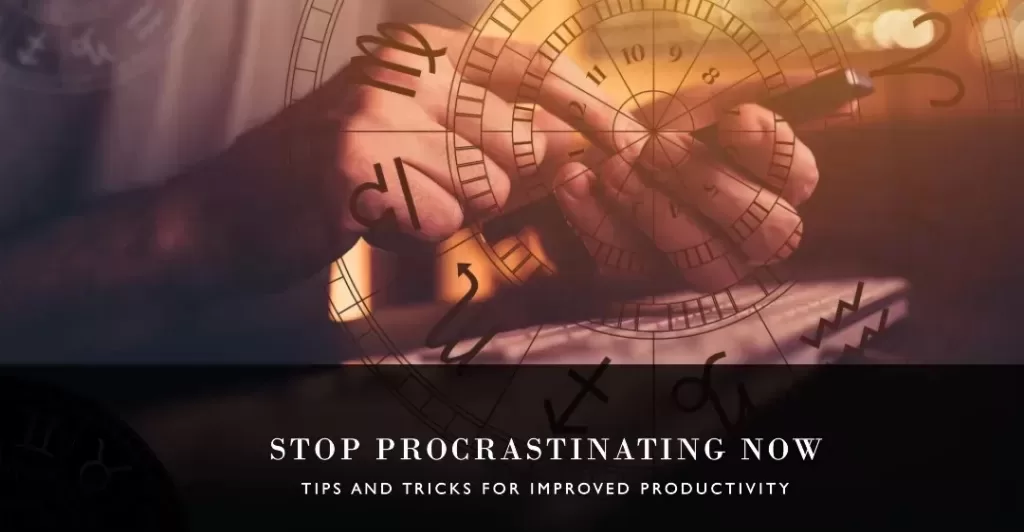You’re not alone if you’ve ever found yourself delaying tasks. Procrastination can be daunting, but it’s not unbeatable. It’s time to stop letting procrastination control your life. This guide will provide you with insights about what drives us to procrastinate and effective strategies to overcome it. Let’s start making progress today!
Table of Contents
- 1 Key Takeaways
- 2 Understanding Procrastination
- 2.1 What Drives Us to Procrastinate
- 2.2 Understanding the Science Behind Procrastination
- 2.3 The Role of Self-Control and Laziness in Procrastination
- 2.4 Chronic Procrastinators: Why Some People Procrastinate More
- 2.5 The Psychological Science of Delay: How it Feeds Procrastination
- 2.6 Cause of Procrastination: Understanding the Procrastination Equation
- 3 Unmasking the Different Types of Procrastination
- 4 Effective Methods to Stop Procrastinating and Start Doing
- 5 Psychologist-Recommended Strategies to Fight Procrastination
- 6 Putting It All Together: A Framework to Overcome Procrastination
- 7 Summary: How to Overcome Procrastination Fast?
Key Takeaways
- Procrastination is a voluntary delay or postponement of tasks;
- Procrastination is prevalent in academic tasks, such as writing papers and studying for exams;
- Procrastination may be driven by the pleasure principle and serve as a coping mechanism for anxiety;
- Procrastination can have negative consequences on mental health, including increased stress and decreased quality of life.
Understanding Procrastination
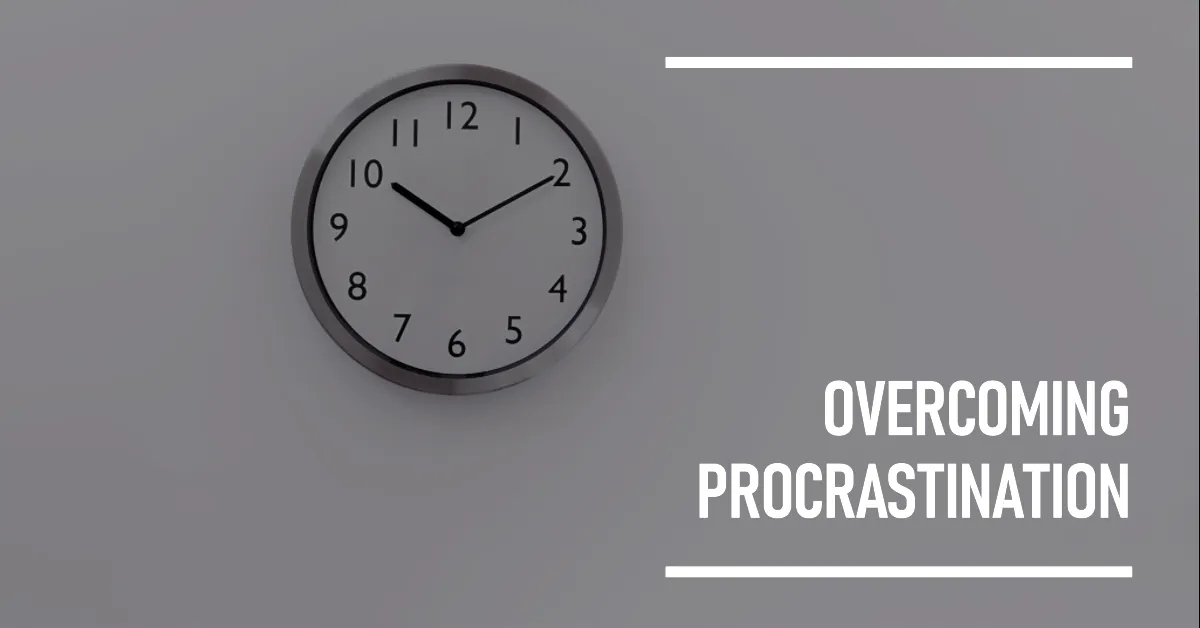
You’re probably looking for ways to halt that pesky habit of procrastinating, and luckily, there are various strategies you can employ like eliminating distractions, setting priorities, and finding motivation through enjoyable activities. It’s essential to understand that the power to stop procrastinating lies in your hands.
One effective strategy is pinpointing what exactly triggers your procrastination. Is it fear of failure? Perfectionism? Once you’ve identified these triggers, you can work on addressing them head-on. You’ll also want to make a habit of breaking down large tasks into manageable chunks; this makes the work seem less daunting and can help keep feelings of overwhelm at bay.
Furthermore, learning how to prioritize tasks according to their importance or urgency will significantly improve your ability to overcome procrastination. Keep in mind that rest is equally important; regular breaks rejuvenate your mind and maintain productivity levels high.
Remember that overcoming procrastination isn’t about achieving perfection but rather progress. Small steps lead to big changes over time. So be patient with yourself as you manifest these new habits into your routine. With persistence and determination, you’ll soon witness a significant decrease in your tendency to delay tasks.
What Drives Us to Procrastinate
You’ve likely battled with procrastination, but do you truly understand the science behind it? Let’s delve into the role self-control and perceived laziness play in this behavior, comprehend why some people are more prone to procrastinate than others, and unravel the psychological aspects of delay that feed this habit. Together we’ll explore the root causes of procrastination by breaking down the ‘Procrastination Equation’ – a journey that can equip you with insights for a proactive change.
Understanding the Science Behind Procrastination
Let’s delve into the science behind procrastination, understanding how it’s linked to our brain’s prefrontal cortex and has a moderate degree of heritability. It’s your command center for decision-making and impulse control but when you’re procrastinating, it gets overwhelmed. This cause of procrastination isn’t an inherent flaw; it’s just your brain struggling with too many inputs.
The solution? Break tasks into smaller pieces. Your prefrontal cortex can handle these without feeling burdened, reducing your urge to delay action. Also, consider utilizing time management tools or seeking support if needed. Remember, understanding procrastination is the first step toward overcoming it.
You’re not doomed by genetics or destined for a life of last-minute panic. You have the power to change this pattern and regain control over your time and productivity!
The Role of Self-Control and Laziness in Procrastination
Self-control and laziness often play significant roles in the act of putting off tasks. You see, procrastination isn’t just about time management, it’s a battle against your own impulses. Laziness can be an easy scapegoat, but here’s the thing: you’re not lazy, you’re human! It’s in our nature to seek immediate gratification over long-term benefits. But don’t despair! You’ve got more self-control than you think. Start by breaking down large tasks into manageable pieces and celebrate each small victory. This will feed your motivation to continue forward. Remember that it’s okay to have off days; forgive yourself and try again tomorrow. By understanding this interplay between self-control and laziness in procrastination, you’re already on the path to overcoming it.
Chronic Procrastinators: Why Some People Procrastinate More
It’s important to understand why some folks put off tasks more frequently than others, and examining the mindset of chronic procrastinators can shed light on this behavior. You see, people procrastinate for various reasons – fear of failure, perfectionism, or even lack of motivation. But why do some people procrastinate more? It’s often due to negative beliefs about themselves or their abilities. Now, you’re not powerless against this. By recognizing these patterns, you can start making small changes today. Break tasks down into manageable parts; celebrate each accomplishment no matter how small; and remember it’s okay to ask for help when needed. Overcoming chronic procrastination takes time and patience with oneself, but with persistence, change is possible!
The Psychological Science of Delay: How it Feeds Procrastination
You’re now diving into the psychological science of delay, understanding how it feeds into your tendency to put tasks off. It’s not just laziness or poor time management that causes you to procrastinate; it’s often a complex interplay of emotions, fears, and self-doubt. But don’t be disheartened! Recognizing this can actually empower you to tackle procrastination head-on. You see, when you delay tasks, you’re essentially prioritizing immediate comfort over long-term benefits. The key is to shift this balance – start small, break down daunting tasks, and celebrate every victory along the way. Remember, overcoming procrastination isn’t about being perfect but about progressing steadily. So next time you feel the urge to delay something, remind yourself of the psychological science behind it and choose action over avoidance!
Cause of Procrastination: Understanding the Procrastination Equation
Let’s dive into understanding the cause of your delayed actions by exploring the procrastination equation – a scientific formula that helps explain why we put off tasks. Essentially, this equation shows that motivation equals expectancy times value, divided by impulsiveness times delay. If you’re finding it hard to stop procrastinating, it could be due to low expectations of success or low value attributed to the task at hand.
But here’s the good news: you can change these variables! Increase your expectancy by honing skills and building confidence. Boost value by attaching personal meaning or rewards to tasks. Control impulsiveness through discipline and mindfulness, while reducing delay by setting clear timelines. Understanding the procrastination equation is your first step toward breaking free from procrastination’s grip!
Unmasking the Different Types of Procrastination

You’ve made it here, and already, that’s a victory against procrastination. Now let’s delve deeper into this topic and unmask the different types of procrastinators starting with an overview of those who delay unpleasant tasks. We’ll also discuss why students are prone to academic procrastination, explore chronic procrastination when delay becomes a lifestyle, debunk the myth that equates procrastination with laziness, and finally face the uncomfortable truth about the negative consequences of habitual delay.
The Unpleasant Task Procrastinators: An Overview
Unpleasant task procrastinators are individuals who delay tasks they find difficult or uncomfortable, often resulting in increased stress and decreased productivity. But don’t worry, it’s not a lifelong trait! You can beat this habit. First, recognize that you’re an unpleasant task procrastinator. Self-awareness is your first step to improvement.
Now, let’s tackle this head-on with our procrastination guide. Break down those large tasks into manageable parts, making them less overwhelming. And remember to reward yourself after each completed part; you’ve earned it! Visualization techniques can also help: imagine the satisfaction of completing the task at hand. I know you might feel like I mentioned this already (because I did), but the point is that it’s vitally important to one’s performance, yet so many people ignore this advice! So don’t be one of them and learn how to organize your tasks and goals effectively!
Academic Procrastination: Why Students Are Likely to Procrastinate
Now that you’ve grasped the concept of unpleasant task procrastinators, let’s steer into a specific area: academic procrastination. You see, students are likely to procrastinate due to a mix of factors: fear of failure, perfectionism, or even simple boredom. It’s not just about laziness! But don’t worry, there’s hope. You can break free from this cycle with our ‘procrastination guide: how to stop procrastinating.’ This guide provides practical steps and strategies to conquer your academic tasks without delay. Remember, overcoming procrastination isn’t an overnight miracle; it requires consistent effort. Yet with perseverance and motivation, you can overcome this hurdle and become more productive in your studies. Let’s dive deeper into understanding academic procrastination and discover ways to tackle it head-on!
Chronic Procrastination: When Delay Becomes a Habit
When it’s not just a one-off delay but a chronic habit, we’re dealing with a different beast altogether: chronic procrastination. It’s when delay becomes a habit that you can’t break free from. But don’t despair! You’ve got the power to change your ways and prevent procrastination from ruling your life.
Start by understanding what’s causing your delays. Is it fear? Disinterest? Once you’ve identified the root cause, tackle it head-on. Create achievable goals and stick to them, no matter how small they seem. Break tasks into manageable chunks and reward yourself after each accomplishment.
Procrastination Isn’t Laziness: Debunking the Myth
It’s a common misconception that delaying tasks is simply a sign of laziness, but in reality, there’s much more to the story. Procrastination isn’t laziness; it’s an intricate psychological struggle. You see, procrastination is the act of postponing or delaying tasks unnecessarily. It’s often a coping mechanism for anxiety or fear of failure, not an indication of you being lazy or unmotivated.
We’re debunking the myth that procrastinators are just lazy individuals who lack willpower. The truth is, overcoming procrastination requires understanding its root causes and developing effective coping strategies. If you’re struggling with this issue, remember: change starts with awareness. Understanding why you delay tasks can help guide your efforts to overcome this challenge and boost your productivity.
P.S. I also tend to procrastinate – typically because I get obsessed about some subjects easily. This means that I might procrastinate cleaning my office because I don’t feel it’s gonna be much of a benefit to me, but at the same time, I will write a whole book in a mere week. Regardless of the tasks I completed INSTEAD OF cleaning my office, I am still procrastinating and doing everything but not that one boring thing I was supposed to do last week. So keep that in mind – procrastinators aren’t always lazy.
The Negative Consequences of Procrastination
Underestimating the detrimental effects of delaying tasks can lead to a multitude of negative consequences, impacting both your mental and physical health. The costs of procrastination are high; it’s not just about missed deadlines or rushing at the last minute. Chronic procrastination can increase stress, trigger feelings of guilt and crisis, and even lead to serious health problems like heart disease. But don’t despair! You’re capable of overcoming this hurdle. Begin by recognizing the effects of procrastination on your life. Then take small but consistent steps toward better time management and prioritization skills. Remember, it’s okay to seek help if you’re struggling with this issue; sometimes an outside perspective is exactly what you need to break the cycle.
Effective Methods to Stop Procrastinating and Start Doing
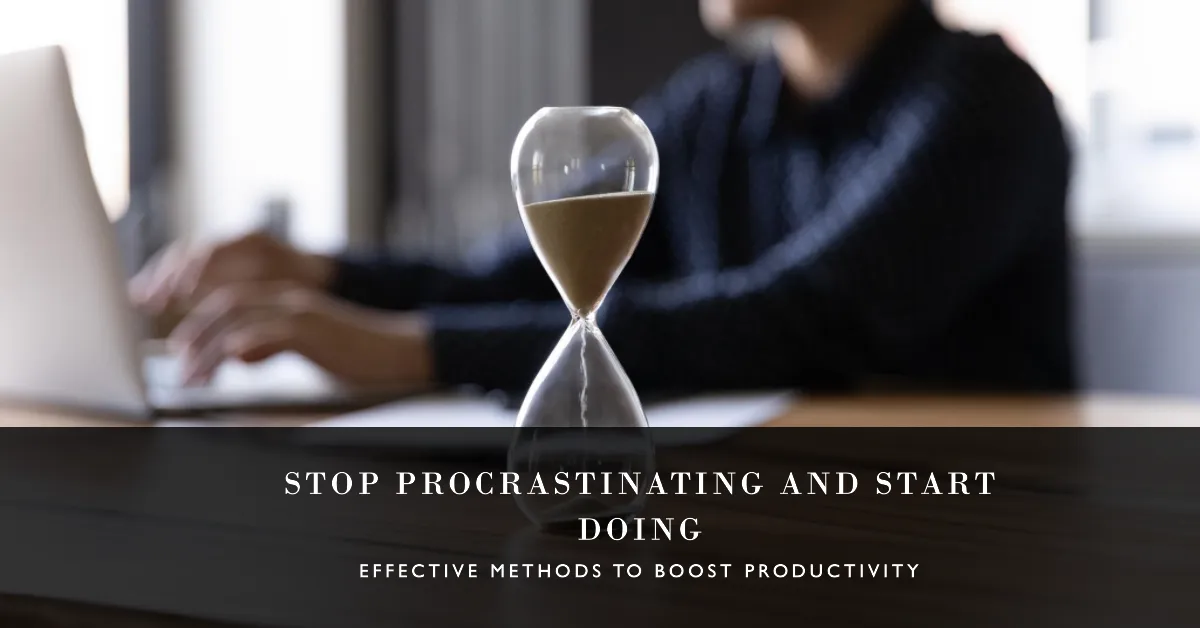
You’re about to embark on a transformative journey toward mastering your time and overcoming procrastination once and for all. We’re going to dive into the art of efficient time management, learn how you can conquer that demotivating to-do list, and explore the power of self-control and discipline in breaking free from procrastination. You’ll discover new personal development strategies to move beyond the procrastination equation, and we’ll also ponder over an intriguing question – is it actually possible to completely overcome procrastination? Let’s get started!
Time Management: A Key Approach to Beat Procrastination
Proper time management’s essential when you’re trying to beat procrastination, as it involves setting realistic goals and approaching tasks in manageable chunks. You’ve got to develop your time management skills if you want to succeed. It’s not about rushing through tasks but making sure you manage time effectively. If you find yourself delaying or postponing something, don’t panic. Break down the task into smaller parts and tackle one at a time; this makes the task less daunting, thus, enhancing productivity.
Take control of your schedule, prioritize your responsibilities, and learn how to delegate when necessary. Remember that it’s okay to say ‘no’ sometimes. With these steps, you’ll find that procrastination has no place in your life anymore! You can do this!
Completing Tasks: How to Tackle the To-Do List
Tackling the to-do list doesn’t have to feel like a mountain; it’s all about breaking down tasks into manageable chunks and taking them on one at a time. This way, completing the task becomes less discouraging. You’re not just putting off a task, you’re rethinking procrastination!
Remember, every journey starts with a single step. Rather than getting overwhelmed by the size of the task, focus on what you can do right now. Acknowledge that progress is progress no matter how small it might be.
So turn that mountain into molehills and watch as your productivity skyrockets. With each completed task, you’ll gain more confidence and momentum to keep going. So let’s get started, one small step at a time!
Overcoming Procrastination through Self-Control and Discipline
So, you’ve mastered your to-do list, but are you still struggling with the self-defeating behavior of procrastination? Let’s move ahead. It’s time to focus on overcoming procrastination through self-control and discipline. Remember, it’s all about making a conscious choice to stop procrastinating and take charge. Yes, it can be challenging at first, but believe in your strength! Self-control is like a muscle – the more you use it, the stronger it gets. Train yourself to prioritize tasks and stick to deadlines no matter what distractions come your way. And discipline? That’s just making a habit of doing things when they need doing rather than when you feel like it. You have this power within you! So go ahead and conquer procrastination today!
How to Move Beyond the Procrastination Equation
Let’s dive into how to move beyond the equation that often keeps us stuck in a cycle of delay. You’re not alone in your struggle with procrastination, but it’s time to put things into perspective. Understand what lies behind procrastination; is it fear, perfectionism, or lack of motivation? Identifying these triggers is your first step toward taking action. Next, set realistic goals and organize them appropriately. Prepare an actionable schedule with deadlines and evenly distribute them over time. This increases your chances of success. Finally, don’t be too hard on yourself. Everyone slips up occasionally; the key is to learn from these instances rather than letting them discourage you. Remember, progress over perfection is what truly matters when overcoming procrastination.
Is it Possible to Overcome Procrastination Completely?
You might be wondering if it’s ever totally possible to conquer those tendencies to delay tasks. Yes, you can indeed overcome procrastination, but it requires understanding and effort. Recognize that an important task can feel daunting, causing you to postpone or delay it. But remember, delaying only increases stress and reduces productivity. Break your task into manageable parts and tackle each piece one at a time. Prioritize your duties based on their significance and deadlines. Reward yourself after completing each part; this will motivate you for the next step. Stay focused, maintain discipline, don’t let distractions deter you from achieving your goals. With persistence and determination, overcoming procrastination is entirely feasible! You have all the power within you to triumph over these tendencies!
Psychologist-Recommended Strategies to Fight Procrastination

You’re not alone in your struggle with procrastination, and you’ve got the power to overcome it! We’ll dive into proven strategies like setting up a reward system to make completing tasks more enticing and prioritization techniques that help you focus on what truly matters. You’ll also discover unusual yet effective psychological methods for combating avoidance and delay, tools for enhancing self-control, and when it might be time to seek professional help if procrastination becomes chronic.
Setting Up a Reward System to Encourage Completion of Tasks
Setting up a reward system could be an effective strategy for overcoming procrastination, as it encourages task completion by associating it with positive outcomes. The idea is simple; you give yourself a treat each time you complete a task. This part of your procrastination guide: how to stop procrastinating, can be quite fun and impactful. You tend to be motivated when there’s something appealing waiting at the finish line. It doesn’t have to be big – maybe your favorite snack or an episode of that series you’ve been dying to watch. Remember, the goal here is to set up a reward system to encourage the completion of tasks. So, stick with it and soon, you’ll find tackling those tasks aren’t so daunting after all!
Focus on the Important Task: Strategies to Prioritize
It’s crucial to focus on what’s truly important when trying to conquer a mountain of tasks. You’ve probably noticed that poor time management can lead you down the path of procrastination. But don’t worry, there are proven strategies to prioritize and stay on track.
Start by identifying your most critical task. This should be something that contributes significantly toward your goals. Once identified, give this task priority over others. Avoid multitasking as it often leads to errors and increased stress levels.
Unusual Psychological Techniques to Deal with Avoidance and Delay
Exploring unusual psychological techniques, you’ll find that they can offer creative ways to tackle avoidance and delay in your tasks. You see, psychologists suggest adopting a growth mindset; viewing your fear of failure as an opportunity for learning rather than an insurmountable obstacle. It’s about shifting focus from the daunting scale of the task to the process of getting things done.
A useful technique is ‘time travel’. Visualize yourself in the future, having completed the task. How does it feel? Now, bring that feeling into the present and let it fuel your motivation. Remember, you’re not alone in this journey against procrastination. Seek help if needed; there’s no shame in reaching out to professionals who can provide strategies tailored to you. Keep going!
P.S. If you feel like you’re not too good with visualization, check out my free imagery training guide.
Psychological Tools to Boost Self-Control
Moving on from unusual techniques to tackle avoidance and delay, we’ll now define procrastination and explore psychological tools to boost self-control. Procrastination is voluntarily delaying tasks, often as a coping mechanism for anxiety or because of impulsiveness. But remember, you’re not alone in this struggle and there are tested methods that can help you stop procrastinating.
Firstly, acknowledge the issue. Avoiding it won’t make it disappear. Next, use psychological tools like mindfulness; stay present in the moment rather than worrying about the future or dwelling on past failures. Practice self-compassion – don’t beat yourself up when things go wrong. Set realistic goals – bite-sized ones are easier to handle.
With these tools and an open mind, you’ll be able to conquer your procrastination habit! It’s time to take control! All you need is to do is develop logical thinking patterns and use common sense when you feel overwhelmed!
Professional Help for Chronic Procrastinators
You might find that despite all your best efforts, there’s still a struggle with delay and avoidance, leading you to consider professional help for chronic tendencies. It’s okay! Many people who procrastinate face this issue in different areas of life, including workplace procrastination. Recognizing the problem is the first step toward the solution.
Professional help for chronic procrastinators can offer tools tailored specifically to your needs and habits. This assistance often comes through therapy or coaching sessions where you’re equipped with strategies to overcome habitual delays. They’ll provide accountability, helping you stay on track while offering emotional support throughout your journey.
Putting It All Together: A Framework to Overcome Procrastination
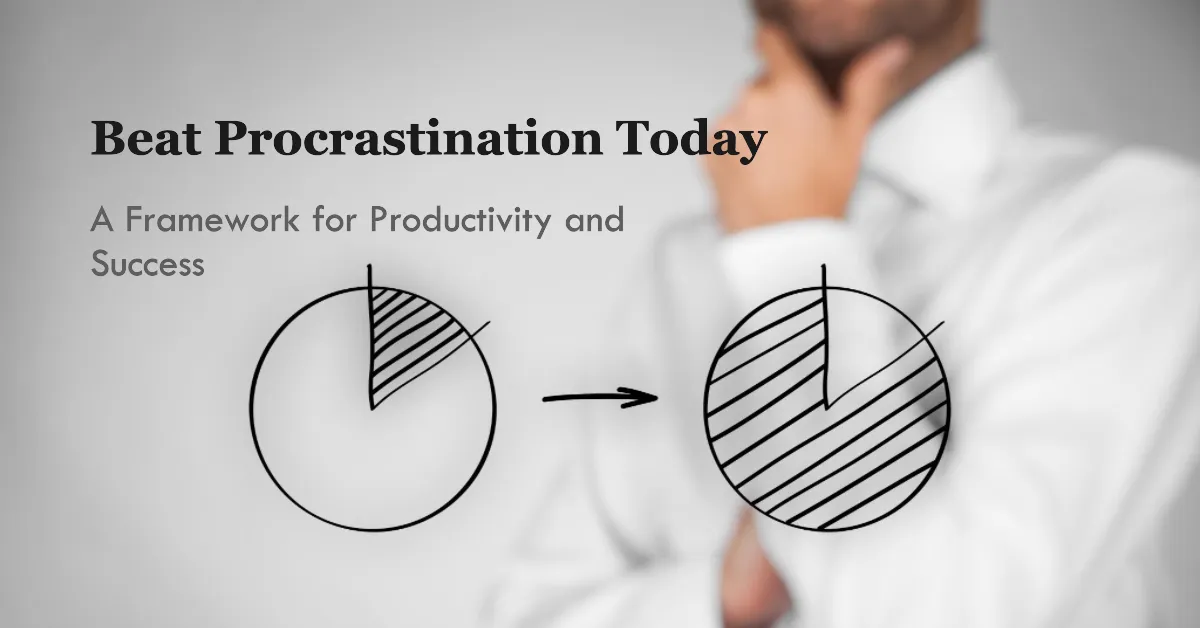
You’re about to embark on a comprehensive exploration of how key elements such as time management, self-control, and task completion intertwine to counter the age-old issue of procrastination. We’ll delve into real-life scenarios and present practical solutions that not only help you tackle procrastination in the short term but also build resilience against it for the long haul. Together, we’ll ensure that procrastination becomes a thing of your past, paving the way for a more productive future.
Linking Time Management, Self-Control, and Task Completion
It’s important to understand that effective time management and self-control are key in successfully completing tasks, thereby reducing procrastination. You see, procrastination may be a result of poor executive functioning – but don’t worry, you can improve this! By linking time management and self-control strategies together, you’ll find yourself breezing through tasks. Start by breaking down larger tasks into manageable parts. This helps make the task feel less overwhelming and increases your chances of completion. Next, exercise discipline by setting specific times for work and sticking to them. Remember that it’s okay to take breaks too! They’re essential for maintaining productivity in the long run. With these techniques, you’ll be mastering task completion in no time!
Building Resilience Against Procrastination: A Long-term Strategy
Now that you’ve explored real-world solutions to tackle procrastination, let’s shift our focus toward building resilience against procrastination: a long-term strategy. Understanding the nature of procrastination is your first step. Remember, it’s not about laziness but more often about fear and anxiety. Procrastination can also be an avoidance tool when tasks seem too daunting or overwhelming. But every challenge brings an opportunity for growth! By adopting consistent habits like setting achievable goals, practicing mindfulness, and celebrating small victories, you can strengthen your resistance against procrastinating tendencies over time. This isn’t just a quick fix; it’s a transformative journey that leads to enhanced productivity and wellbeing. Keep believing in yourself; the power to overcome is within you!
Reinforcing the Outcome: Ensure Procrastination Remains a Thing of the Past
You’re on the right track; maintaining your momentum is crucial to ensure delaying tasks becomes a thing of the past. Procrastination tends to be an issue for many, but you’ve taken important steps toward overcoming it. Now, let’s focus on reinforcing the outcome: ensuring procrastination remains a thing of the past.
Start by recognizing your achievements, no matter how small – create a journal and note down all the battles won. Every task completed is a victory against procrastination and contributes to creating healthy habits. It will help you motivate yourself when you’re struggling and serve as a reminder that you have done it countless times already – all you need to do is to repeat the process one more time. Keep in mind that long-term benefits come from consistent effort and perseverance; there are no shortcuts.
Don’t shy away from seeking help when needed; sharing your struggles with someone can provide fresh insights and solutions. Remember, staying proactive and committed will help keep procrastination at bay!
Summary: How to Overcome Procrastination Fast?
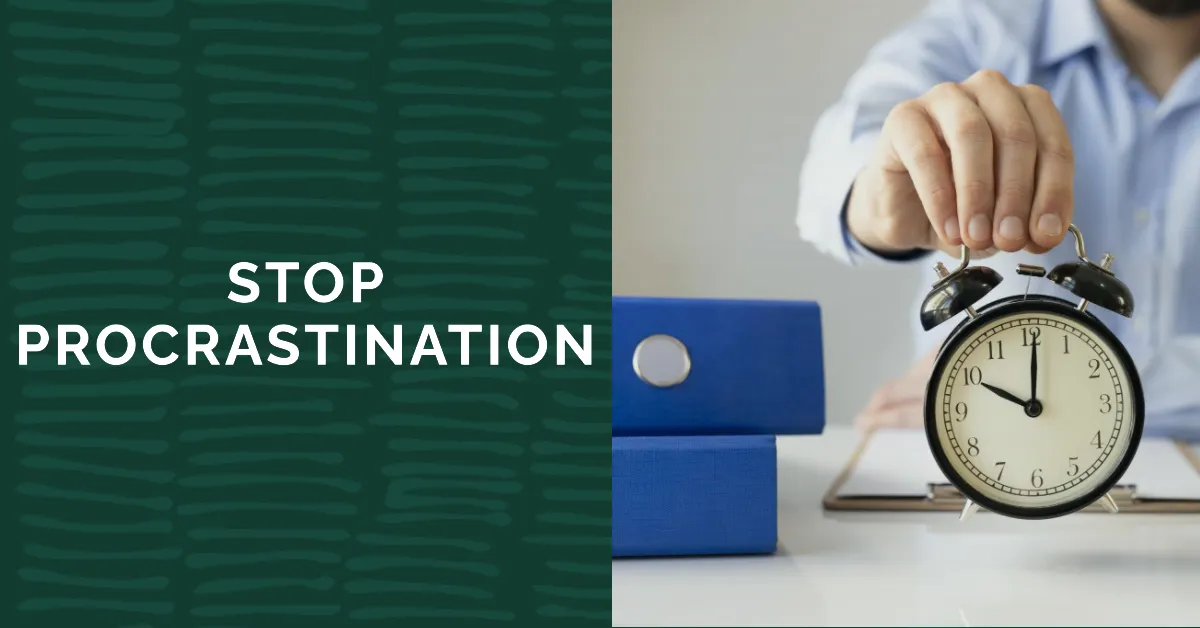
What is the cause of procrastination?
According to Piers Steel, a Canadian professor of procrastination, procrastination is not always a sign of laziness as it’s often thought. It can also indicate symptoms of depression or feelings of overwhelm. Factors such as fear of failure, lack of motivation, and indecisiveness often play a role in procrastination.
Why do people procrastinate despite knowing the importance of the task?
People often delay important tasks due to the discomfort or stress associated with them, this is a behavior known as procrastination. It seems counter-intuitive, but research has already confirmed that procrastinators do acknowledge the importance of the task yet choose to focus on the short-term comfort of avoiding it.
Can procrastination be linked to any personality trait?
Yes, procrastination is often linked to certain personality traits. Dr. Pychyl suggests that individuals with high levels of impulsiveness and with low self-discipline often show signs of procrastination. Similarly, perfectionists also tend to procrastinate due to their fear of not meeting high standards.
What is the science behind procrastination?
The science behind procrastination involves both psychological and neurological aspects. Psychologically, procrastination is linked to stress and the desire to avoid discomfort. Neurologically, it’s about the struggle between the prefrontal cortex (task management) and the limbic system (pleasure center). The immediate pleasure often wins over the long-term benefits of completing a task.
What role does academic procrastination play in students’ lives?
Students who consistently practice academic procrastination may face negative impacts on their mental health, such as increased stress and illness. Moreover, procrastination can lead to lower grades, reduced learning, and poor understanding of subjects, thereby hampering academic performance.
What is active procrastination?
Active procrastination is a type of procrastination where individuals deliberately delay tasks but use that delay to their advantage. Active procrastinators are confident in their ability to complete tasks within a pressured timeframe and often find that they perform better under such conditions.
How does procrastination impact one’s physical health?
Chronic procrastination can lead to a significant increase in stress, which can further induce various health problems like cardiovascular disease and hypertension. Procrastination also can exacerbate pre-existing health conditions due to the added stress associated with delaying tasks.
Is it true that at one point or another, everyone procrastinates?
Yes, it is a common behavior to procrastinate at one point or another. However, the habit becomes a problem when it starts interfering with one’s daily life, tasks, and responsibilities. It’s important to understand the reasons behind procrastination and take steps to overcome it.
What’s the relation between feelings of overwhelm and procrastination?
Feelings of overwhelm often lead to procrastination as a defense mechanism. When a task feels too big or too complicated to handle, people tend to procrastinate as a way to avoid the stress and negative emotions associated with the task.
Is procrastination a sign of laziness – what’s your take on this?
According to research, procrastination is not always a sign of laziness. It is a complex psychological behavior that involves various factors such as fear of failure, perfectionism, and impulsiveness. Oftentimes, people procrastinate not because they don’t want to do the task, but because they are overwhelmed, scared, or uncertain about it.

